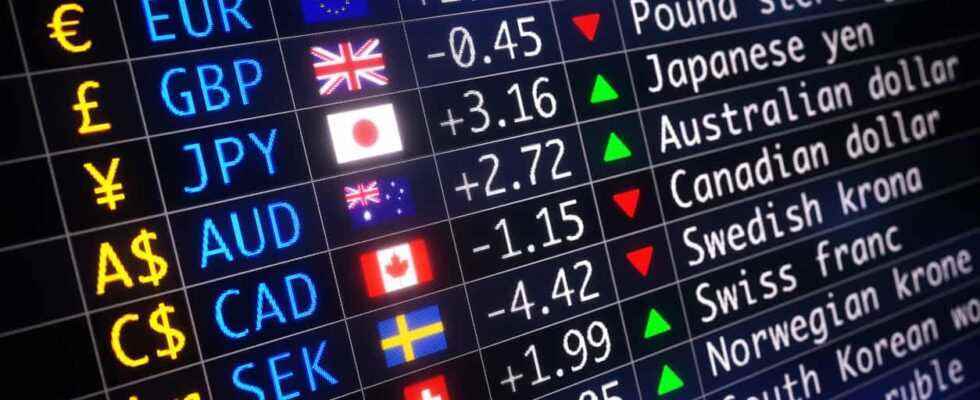(BFM Bourse) – The Japanese currency continues to sink, having reached new lows in twenty years against the dollar this week. Japanese authorities said on Friday that they would take “appropriate measures if necessary” against the fall of the yen, without specifying which ones.
The Japanese currency continues to sink, having reached new lows in twenty years against the dollar this week. A normally favorable exchange rate trend for the Japanese economy, which is very internationally oriented, but whose perverse effects are becoming worrying.
One dollar was trading for 133.9 yen on Friday after climbing well above 134 yen in recent days. If it exceeded 135.15 yen, it would mark a new high since October 1998.
The fall of the yen is notably caused by the mismatch between the still very accommodative monetary policy of the Bank of Japan (BoJ) and that of the US Fed which is tightening, making dollar debt securities more attractive for investors. This trend increased from March with the war in Ukraine, which accentuated the surge in the prices of oil and other raw materials.
“Appropriate measures if necessary” against the fall of the yen
The Japanese authorities repeat that sharp movements in the yen are “undesirable” because it complicates market forecasts for Japanese companies and, in the worst case, it could cause a loss of confidence in yen-denominated assets. In an extremely rare joint statement, the Japanese Ministry of Finance, the Bank of Japan (BoJ) and the Japanese financial policeman (FSA) said on Friday that they would take “appropriate measures if necessary” against the fall of the yen, without specifying which ones .
However, a unilateral intervention by Tokyo on the foreign exchange market seems unlikely, as does a reversal by the BoJ, which remains convinced that the advantages of a weak yen outweigh the disadvantages. As the country’s large companies are very internationally oriented, “a weak yen directly contributes to supporting Japan’s exports,” Alvin Tan, a specialist in the foreign exchange market at RBC Capital Markets, told AFP.
This artificially inflates the profits of Japanese companies generated abroad once converted into yen, which pleases the Tokyo Stock Exchange. The weakness of the yen could also help Japan to revive its tourism industry in the coming months, which had become a significant growth factor before the pandemic.
More expensive imports
The main immediate downside of the decline of the yen is to make imports from Japan even more expensive, starting with its large fossil fuel supplies. However, “more expensive imports negatively affect consumers”, recalls Mr. Tan, which risks slowing down the post-pandemic recovery in the country. For Japanese households, the weakening of the yen is akin to a double jeopardy because they are already faced with an awakening of inflation in the country, caused by the increase in the cost of imports.
A sign of the current tensions, BoJ Governor Haruhiko Kuroda had to publicly retract on Wednesday controversial remarks made a few days earlier, when he claimed that the Japanese were becoming more “tolerant” towards inflation because they had accumulated money. savings during the pandemic. The rise in consumer prices in the archipelago (excluding fresh products) accelerated to 2.1% in April over one year, a level not seen since 2015, and even since 2008 excluding periods of VAT increases.
A virtuous circle?
On the other hand, the weak yen bolstering imported inflation “could also be viewed as a positive, as it could help entrench an inflation outlook in a country that has suffered from deflation for so long,” according to Mr. Tan. Mr. Kuroda also hopes that this will put an end to the “deflationary mentality” that the Japanese economy has dragged like a ball and chain since the 1990s.
Inflation driven solely by imported costs is not healthy for the economy, and this is why the BoJ does not plan to raise rates for the time being. But in the long term, this situation could generate “a virtuous circle” in which prices increase moderately while corporate profits, employment and wages improve, argues Mr Kuroda. Provided that employers play the game and that the government carries out ambitious structural reforms.
Without the BoJ officially acknowledging it, its extremely flexible monetary policy is also very convenient for indirectly refinancing Japan’s abysmal public debt and thus supporting the government’s successive recovery plans.
(With AFP)
Tradingsat Tradingsat – ©2022 BFM Bourse
